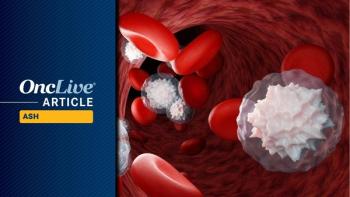
NXC-201 demonstrated organ responses in 70% of evaluable patients with relapsed/refractory light chain amyloidosis.

Your AI-Trained Oncology Knowledge Connection!


NXC-201 demonstrated organ responses in 70% of evaluable patients with relapsed/refractory light chain amyloidosis.

Real-world elranatamab led to higher response rates despite less favorable baseline characteristics vs real-world teclistamab in R/R multiple myeloma.

Glofitamab and epcoritamab were both associated with early disease progression in relapsed/refractory large B-cell lymphoma.

Anito-cel showed deepening responses in patients with relapsed or refractory myeloma enrolled in the phase 2 iMMagine-1 study.

Bezuclastinib markedly improved symptoms and disease markers in nonadvanced systemic mastocytosis, showing durable benefit and a manageable safety profile.

Revumenib displayed responses irrespective of disease subtype in relapsed/refractory acute leukemia harboring a KMT2A rearrangement.

With longer median follow-up, talquetamab plus pomalidomide produced an ORR of 85.7% in patients with relapsed/refractory multiple myeloma in MonumenTAL-2.

The combination of belantamab mafodotin, pomalidomide, and dexamethasone showed a median PFS of 32.6 months in relapsed/refractory multiple myeloma.

TERN-701 yielded a high response rate with deep molecular responses in patients with heavily pretreated chronic phase chronic myeloid leukemia.

Experts reflect on pivotal data from the 2025 ASH Annual Meeting that are set to change practice in AML, MZL, FL, and multiple myeloma.

Oral azacitidine demonstrated a similar pharmacokinetic and safety profile to the subcutaneous formulation in MDS or CMML.

Nuvisertib demonstrated clinical activity as both a single agent and in combination with momelotinib for patients with relapsed/refractory myelofibrosis.

Sankalp Arora, MD, discusses the efficacy of azacitidine/venetoclax/gilteritinib in newly diagnosed, adverse-risk, FLT3 wild-type acute myeloid leukemia.

Axi-cel led to durable responses and manageable safety in patients with relapsed/refractory follicular lymphoma.

Manali Kamdar, MD, discusses the long-term efficacy findings with lisocabtagene maraleucel in patients with relapsed/refractory large B-cell lymphoma.

Pelabresib plus ruxolitinib improved primary and secondary efficacy end points vs ruxolitinib alone in JAK inhibitor-naive myelofibrosis.

Long-term follow-up data from the AGAVE-201 trial showed that safety and survival outcomes with axatilimab were maintained in patients with chronic GVHD.

The in vivo, BCMA-directed CAR T-cell therapy produced initial MRD-negative responses and persistent CAR T-cell expansion in 4 patients with relapsed/refractory myeloma.

GC012F/AZD0120 produced responses in high-risk, transplant-eligible multiple myeloma, as well as transplant-ineligible, newly diagnosed disease.

Early teclistamab discontinuation after deep response showed PFS comparable to continuous therapy in relapsed/refractory myeloma in the LimiTEC trial.

Teclistamab/daratumumab improved survival outcomes and led to deep MRD-negative responses vs daratumumab-based regimens in relapsed/refractory myeloma.

Pitrobrutinib monotherapy showed significant efficacy improvements in first-line CLL/SLL compared with BR treatments.

Zanubrutinib plus venetoclax maintained a 36-month PFS rate of 87% (95% CI, 78.6%–92.4%) in treatment-naive CLL/SLL.

GLPG5101 produced responses and had a manageable safety profile in relapsed/refractory non-Hodgkin lymphoma, including mantle cell lymphoma.

The safety profile associated with MK-1045 administration was manageable with dose interruption and standard medical care.

Zanubrutinib shows sustained 6-year efficacy and safety in treatment-naive CLL/SLL, outperforming BR with durable PFS and high response rates.

Lori A. Leslie, MD, discusses 3-year efficacy findings with epcoritamab plus rituximab and lenalidomide in previously untreated follicular lymphoma.

Fadi Haddad, MD, discusses the efficacy of asciminib in patients with newly diagnosed chronic myeloid leukemia as seen in a phase 2 trial.

Triplet therapy with tagraxofusp/azacitidine/venetoclax led to high remission rates and had a safety profile similar to that of tagraxofusp alone in BPDCN.

Sonrotoclax monotherapy led to an ORR of 52.4% and a CR rate of 15.5% in relapsed/refractory MCL.